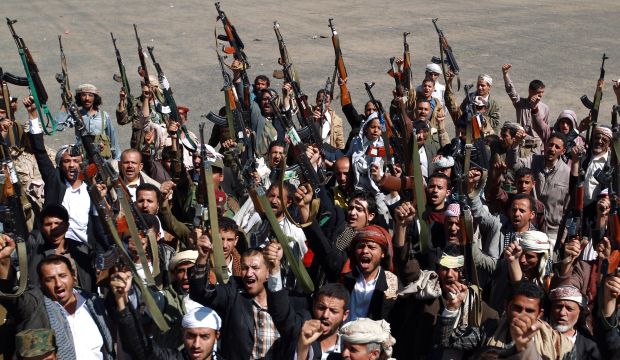
Yemeni armed members of the Shi’ite Houthi movement shout slogans as they take part in a demonstration in Sana’a on February 4, 2015 in support of the militia which overran the Yemeni capital in September. (AFP/Mohammed Huwais)
Sana’a, Asharq Al-Awsat—UN special envoy to Yemen Jamal Benomar warned that the country is sliding towards civil war as a deadline offered by the Shi’ite Houthi movement to fill the power vacuum following President Abd Rabbuh Mansur Hadi’s resignation expired on Wednesday.
Speaking during a press conference in Sana’a, Benomar said: “The situation is very serious. Yemen is on the brink of collapse. If the situation is not contained, the country will enter a civil war.”
Benomar, who serves as UN Secretary-General Ban Ki-moon’s Special Adviser on Yemen, warned that the issue is not just the power vacuum in Sana’a following the resignation of the Yemeni government but also the intensifying presence of Al-Qaeda among Yemen’s Sunni tribes, and the prospect of South Yemen attempting to split from the rest of the country.
“For the first time in Yemen, we see the tribes embracing Al-Qaeda members . . . While the only reason that the South has not seceded is due to the fragmentation of the Southern Al-Hirak movement,” he added.
The Houthis had given the country’s political factions until Wednesday morning to establish an interim government until a new president can be selected, while also demanding the appointment of a new head of the armed forces. Yemeni President Abd Rabbuh Mansur Hadi and his premier and cabinet resigned in late January, after Houthi fighters occupied the presidential palace in the capital Sana’a.
Following Hadi’s resignation, Yemen’s Shi’ite Houthi militia have sought to further expand their presence in Yemen’s various provinces, with renewed fighting reported between the group and Sunni tribesmen in Shabwah governorate.
The UN-envoy has mediated talks between Yemen’s various political parties following Hadi’s resignation, although no deal has yet emerged, with the Houthis staying away from the dialogue. “Every party is viewing the issue from its own narrow perspective and seeking to serve its own interests,” Benomar said of the talks.
“I am a diplomat, and my primary mission is to assist the different political parties to reach solutions to problems and challenges, but what we are seeing are Yemeni political parties refusing to acknowledge their mistakes,” he said.
It is unclear what Yemen’s Shi’ite Houthi movement intends to do following the expiration of the deadline, leaving observers uncertain if the group intends to attempt to seize sole control of the Yemeni government. The Houthis have called for their militia to become part of Yemen’s army and police force as part of attempts to secure their grip on power in the country, but have so far appeared reluctant to physically take over the country’s government and governing institutions.
The Houthis could extend the deadline to allow Yemen’s political parties to conduct further UN-sponsored dialogue to form an interim government. Alternatively, they could seek to transfer power to Yemen parliamentary speaker Yahya Al-Raiee, who according to the constitution would have 60 days to arrange presidential and parliamentary elections. However some observers fear that the Shi’ite Houthi group could seek to return ally, former Yemeni President Ali Abdullah Saleh, to office, reversing the Gulf Cooperation Council (GCC) brokered Riyadh Agreement that secured the transfer of power in Yemen in 2012.
